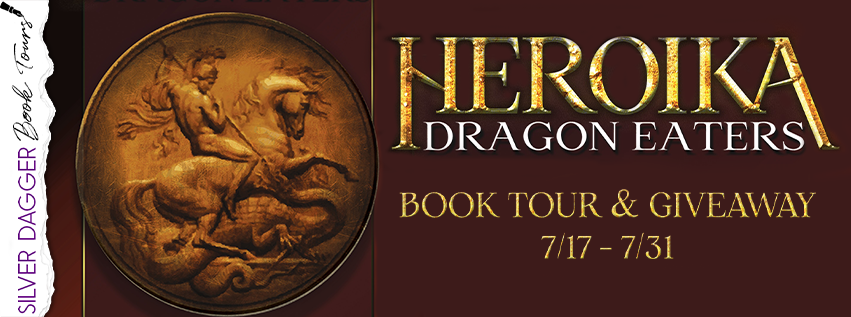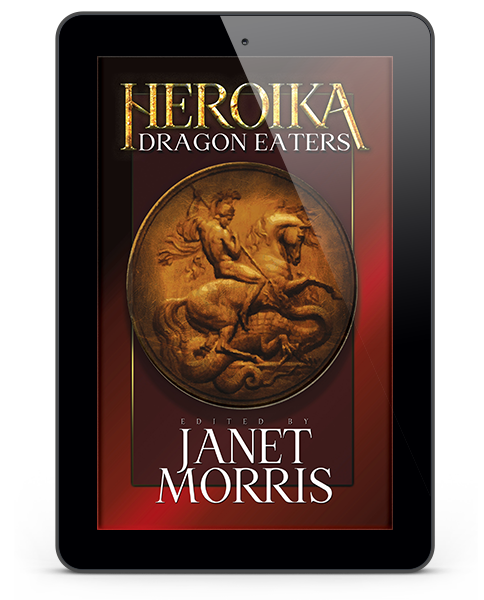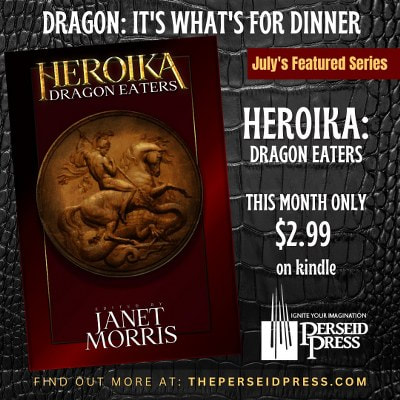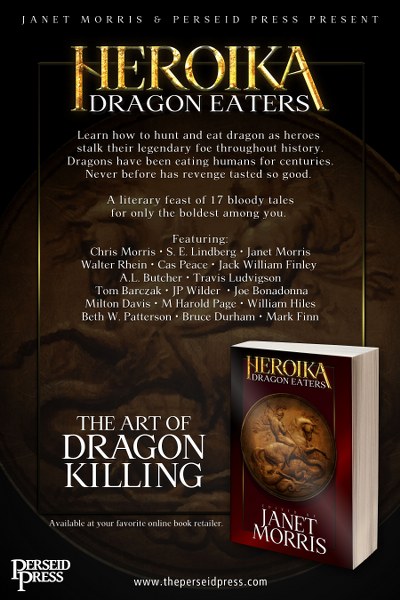The art of dragon killing.
Seventeen writers bring you so close to dragons you can smell their fetid breath.
Heroika: Dragon Eaters
Heroika Volume 1
Edited by Janet Morris
Genre: Epic Historical Fantasy Adventure Anthology
Janet Morris and Chris Morris, The First Dragon Eater
S.E. Lindberg, Legacy of the Great Dragon
Janet Morris and Chris Morris, Bring Your Rage
Walter Rhein, Aquila of Oyos
Cas Peace, The Wyght Wyrm
Jack William Finley, The Old Man on a Mountain
A.L. Butcher, Of Blood and Scales
Travis Ludvigson, Night Stalkers
Tom Barczak, Forged
JP Wilder, Rhyme of the Dragon Queen
Joe Bonadonna, The Dragon’s Horde
Milton Davis, Wawindaji Joka (The Dragon Hunters)
M Harold Page, Sky Tomb of the Earth Kings
William Hiles, Red Rain
Beth W. Patterson, La Bétaille
Bruce Durham, Arctic Rage
Mark Finn, Sic Semper Draconis
**Heroika: Dragon Eaters is Perseid Press' featured series for July and is on sale for Only $2.99 on Kindle!!**
Bring Your Rage
Janet Morris and Chris Morris
When I first saw Rhesos, he came riding a horse white as sunlight, a black dog at its heels, between two breast-high piles of dragon carcasses, toward the Paeonian way-station where we combatants all gathered. He wore no armor, only a cap made from the scalp of a fox and a multicolored zeira, the billowy Thracian riders’ cloak, over pantaloons and fawnskin boots. When the horse shied at the skinned dragons smoking over firepits in the morning glare, he clapped his legs against his mount’s sides.
Now when a horse shies sideways in a single jump, an unwary rider is fast unseated; a half naked rider, with no surcingle, no toe loops, oft comes tumbling to the ground. Not this man: he rode as one with his horse, deep-seated, his buttocks, thighs and calves tight to its barrel. In his right hand he carried an ash spear, and this he rapped against his mount’s shoulder, while with his left hand he loosed his reins, urging the horse past the piled corpses.
I had never seen a maneuver like that, but the war-horse knew it well and, with one disapproving snort, lunged on by the bloody stacks, coming straight toward me where I stood on the shelter’s porch. Men seldom impress me by posturing, but this one rode like a god, and looked right at me between his horse’s ears. So I hesitated a moment, nearly smitten, watching, before I went back inside.
This roadhouse, built poor and spare into the berm like the Spartan kind, held a score of men — and now me, once again. The group of us, brought together by choice and challenge, had hunted yesterday, and would again on the morrow; most men were drinking and carousing, boorish and loud. By now they were accustomed to me: I had been here six days and made my share of the kills piled outside, so when I filled a clay cup from the krater by the door and took a seat, none remarked me.
Then in came the Thracian rider, pausing on the threshold, blocking out the light, legs spread, his spear a walking stick, looking right, looking left.
Everyone stopped talking.
Fast as a blink, the stranger tossed a vellum-wrapped stone so that it landed in our midst. “‘Dragon eaters, bring your rage,’ this says. So here I am, withal.” Low voice, soft tone. This one knew what he’d walked into. “So what’s to lose, and what’s to gain?” Up beside him came his big black dog, lip lifted, growling around.
Those assembled looked at one another, then all looked to Thoas, whose invitation wrapped the stone.
So did I.
Thoas, the lame and grizzled Achaean, pushed the thrown stone aside with his toe. “War is brewing, stranger, thus have I called this hunt. Here we stalk dragons to find the strongest, the bravest among you northerners, to fight at Troy. What’s to lose? Your life. What’s to win? Your legend — your aristeia, to be claimed in my contingent on the battle lines at Ilion. I am Thoas, son of Andraemon, lord of Aetolia. I seek only the best of you barbarians to ship with me.”
“Win my legend? As you say, Aetolian Thoas, I am a barbarian. What need I with Greek glory?”
“Yet you came here, responding to my summons for dragon eaters? Who fights a dragon is brave; who fights the red dragon hungers for greater glory, the sort found upon the beach at Troy. Those who hunt with me and pass my test, I’ll take in my black ships to Ilion.”
The gathered warriors pounded tables with their cups.
At this the black dog growled and barked and crouched to launch himself if need be against the noisy men, but the Thracian quieted the hound with a touch and took off his fox-scalp cap, freeing hair red as my own: “Dragon eaters, are you all? Who ravish any woman, willing or not; who kill for spite and pleasure, not need — women, children, dogs? Who put prowess over honor? These are the bravest of us northern barbarians? I came for a hunt, some sport, to see what this summons meant, and now I’ll leave rather than enlist against Ilion. I am Rhesos, son of Eioneos, if you like; or son of Strymon, if you think men be made by gods. The Trojans, not lying Greeks, are my allies and friends.”
King of Thrace, then, was this Rhesos — or so he claimed, riding in alone, not with thousands or even hundreds at his back; half naked, armed with one spear, one horse and a dog. Yet he looked every inch a king to me, if young for it.
Now, I thought, comes the quarrel. I got up to move from the midst of these two, as did the others. Benches scraped back, men shifted toward their fellows. Of all twenty, only a handful so far had taken up the Achaean’s cause. The rest, like this Rhesos, had come to hunt for sport and honor.
Thoas lumbered to his feet but kept his hands in plain sight. “Son of Strymon the river god, are you? Raised by nymphs? What think you, dragon eaters: is this how a demigod behaves? Is this how a dragon eater treats with his brothers?”
The dog growled and barked again, while the gathered men shouted and snarled, thumped their tables and stamped their feet, goading the Greek and the Thracian toward a brawl.
Rhesos held still, but for blue eyes slashing from face to face to face and another touch to his dog, who waited, trembling and eager. “I have my own war to win with Greater Scythia. My forces march this way. They’ll be along. But since I’d heard of this adventure, I thought to come ahead, take a look, spend a day, see who answered this call to slaughter.”
One fleshy dragon eater, barely old enough to raise a pimply black beard, taunted, “I’m Carnabon, here to kill the red dragon, for I’m descended from Carnabon the dragon killer and king of the Getae. And I say Eionian kings can’t fight, it’s well known. Or will you prove me wrong?”
“Wrong? We’ll see. But you’ll prove me right: boys who think themselves heroes fall first in battle.”
Another, a dusky Kikone with corded hair, gibed: “So, fight the red dragon with us, prove your words and your skill, king of Thrace —”
At that, Thoas jeered: “Aye, face the red dragon, barbarian king, and see if the Fates let you live to fight Scythians.”
“Done. But I’ll fight it alone. All you mighty warriors take your turns, and should you fail, I’ll kill the beast in your honor and burn its carcass on your pyres. Now, I need to see to my horse.”
He turned on his heel, and I thought he would get on that horse and ride away; plenty of daylight left for a hasty retreat.
“Done then, Thracian,” called Thoas after him, as nervous laughter and boastful talk resumed in the station. “Penthesilea,” Thoas boomed, “see to his needs — from the way he speaks of women you’ll be safer with him than will any of us.”
I flushed but rose and followed the Thracian out into the sunlight as mocking calls chased after me.
The young king was picking stones from his horse’s left front foot with his knife. He put down the hoof he held and took up his spear when I approached. “You?”
“Thoas says I’m to help you. This way,” and I started around the back, where our horses grazed on fenced land, and straight stalls held the wild ones.
“Penthesilea the Amazon queen, are you?” said the Thracian, pacing me.
“Penthesilea of Azzi, yes. Daughter of Ares and Otrera.”
“Why are you here, doing the bidding of a Greek, daughter of Ares, patron god of Thrace?”
I turned my face away, then back, as we came to the corner beyond which the horse pens stretched. This Rhesos made me crave the touch of a man; such fire hadn’t burned in me for a very long time. In Azzi, where newborn boys are exposed on hillsides or sent young to their fathers, the few men we keep are slaves and breeders of daughters. I wouldn’t lie to this one: lies are the sinkholes of the heart. “You have not heard, then: by accident I killed my sister, Hippolyta, with a spear while we were hunting deer. I am undone with grief. I wish only for death, so much did I love her. But I am an Amazon warrior and must die honorably — in battle. Battle against a dragon will be honorable enough.”
Rhesos sighed. “Will it?” His black dog whined, wagged its tail uncertainly, and looked up at me; the horse between us pulled back on its lead so for a moment we stood face to face. “Penthesilea, you’re an Azzi warrior. These gathered are angry folk and failing folk and grieving folk hoping to die, like you. Ask yourself why Thoas, Aetolian lord and son of Andraemon, is reduced to raising troops in the back country. His rank came easy, bestowed; he never fought for it. Such men are too much concerned with their aristeia. So he’ll settle an old score with this red dragon who lamed him, I think, before he ships with the Achaeans to meet his doom at Troy.”
“His life. His sorrow. His choice,” I scoffed. “What difference to you, whatever he does?”
“None. But you saw the boy, Carnabon, who spoke up first? There’s one who’s lost his lover and wants to die hard, and soon. He’ll take point in any skirmish, get out in front of any charge, be dragon-bait, end his suffering the only way he can — by a wound that stops his heart. And the Kikone — he’s a banished one, here without his fellows; a man not welcome at home seeks death in foreign lands. That roadhouse is full of ghosts soon to be.”
“And I am such a ghost, you say? You see too much, for a man so young.”
“Are you not?” Rhesos clucked to the white mare and urged her forward to an empty pen with good grass and a stream meandering through it. He said nothing further until he’d removed her bridle and closed up the pen, log into log. “If you long to die covered in glory, why waste your blood on dumb beasts? Die honorably in battle fighting for Ilion, not against her, and not with Thoas’ Aetolian rabble.” He took up his spear and leaned his cheek against its head. “All know he’s promised the Achaeans forty ships, a great contingent. He aches to fight Trojans, for he was among Helen’s suitors but failed to win her. That man cannot stand to lose, and many will die for his pride before he pays the boatman.”
“Ah, women and men in war: a deadly posset.” This close, the muscles of his naked chest, shifting when he breathed, made me lightheaded, who had never suffered a man to touch my flesh in passion. . . .
“Penthesilea, I myself will go to war at Ilion when we’ve dealt with these Scythians plaguing us. You might get there before us, since the Scythians are many and time is fleeting, and be dead before I arrive. So how sounds this? You pledge me your troth to fight at Ilion for the Trojans, and I will have fulfilled my purpose here, dragon or no. Bring some friends: a dozen Amazons are worth a hundred men in any battle.”
“And?” I said in a voice not nearly strong enough, consumed with the way his body called to mine.
“And, since you’re so hot to die, give me your heart tonight. Why not, if tomorrow you’ll give Thoas your life to spend in a battle with his personal dragon?”
Best selling author Janet Morris began writing in 1976 and has since published more than 30 novels, many co-authored with her husband Chris Morris or others. She has contributed short fiction to the shared universe fantasy series Thieves World, in which she created the Sacred Band of Stepsons, a mythical unit of ancient fighters modeled on the Sacred Band of Thebes. She created, orchestrated, and edited the Bangsian fantasy series Heroes in Hell, writing stories for the series as well as co-writing the related novel, The Little Helliad, with Chris Morris. She wrote the bestselling Silistra Quartet in the 1970s, including High Couch of Silistra, The Golden Sword, Wind from the Abyss, and The Carnelian Throne. This quartet had more than four million copies in Bantam print alone, and was translated into German, French, Italian, Russian and other languages. In the 1980s, Baen Books released a second edition of this landmark series. The third edition is the Author's Cut edition, newly revised by the author for Perseid Press. Most of her fiction work has been in the fantasy and science fiction genres, although she has also written historical and other novels. Morris has written, contributed to, or edited several book-length works of non-fiction, as well as papers and articles on nonlethal weapons, developmental military technology and other defense and national security topics.
Janet says: 'People often ask what book to read first. I recommend "I, the Sun" if you like ancient history; "The Sacred Band," a novel, if you like heroic fantasy; "Lawyers in Hell" if you like historical fantasy set in hell; "Outpassage" if you like hard science fiction; "High Couch of Silistra" if you like far-future dystopian or philosophical novels. I am most enthusiastic about the definitive Perseid Press Author's Cut editions, which I revised and expanded.'
Website * Facebook * Twitter * Instagram * Bookbub * Amazon * Goodreads
Follow the tour HERE for special content and a giveaway!













No comments:
Post a Comment